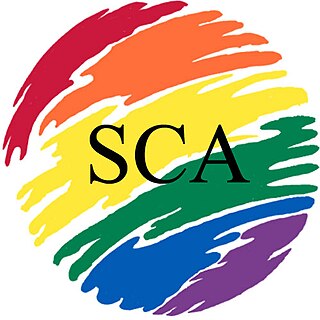Hypersexuality is extremely frequent or suddenly increased libido. It is controversial whether it should be included as a clinical diagnosis used by mental healthcare professionals. Nymphomania and satyriasis were terms previously used for the condition in women and men, respectively.
Pornography addiction is the controversial application of an addiction model to the use of pornography. Pornography may be part of compulsive sexual behavior with negative consequences to one's physical, mental, social, or financial well-being. While the World Health Organization's ICD-11 (2022) has recognized compulsive sexual behaviour disorder (CSBD) as an "impulsive control disorder", CSBD is not an addiction, and the American Psychiatric Association's DSM-5 (2013) and the DSM-5-TR (2022) do not classify compulsive pornography consumption as a mental disorder or a behavioral addiction.
A food or eating addiction is any behavioral addiction that is primarily characterized by the compulsive consumption of palatable food items which markedly activate the reward system in humans and other animals despite adverse consequences.

Problem gambling or ludomania is repetitive gambling behavior despite harm and negative consequences. Problem gambling may be diagnosed as a mental disorder according to DSM-5 if certain diagnostic criteria are met. Pathological gambling is a common disorder that is associated with both social and family costs.
Impulse-control disorder (ICD) is a class of psychiatric disorders characterized by impulsivity – failure to resist a temptation, an urge, or an impulse; or having the inability to not speak on a thought. Many psychiatric disorders feature impulsivity, including substance-related disorders, behavioral addictions, attention deficit hyperactivity disorder, fetal alcohol spectrum disorders, antisocial personality disorder, borderline personality disorder, conduct disorder and some mood disorders.
Substance dependence, also known as drug dependence, is a biopsychological situation whereby an individual's functionality is dependent on the necessitated re-consumption of a psychoactive substance because of an adaptive state that has developed within the individual from psychoactive substance consumption that results in the experience of withdrawal and that necessitates the re-consumption of the drug. A drug addiction, a distinct concept from substance dependence, is defined as compulsive, out-of-control drug use, despite negative consequences. An addictive drug is a drug which is both rewarding and reinforcing. ΔFosB, a gene transcription factor, is now known to be a critical component and common factor in the development of virtually all forms of behavioral and drug addictions, but not dependence.
Sexual addiction, also known as sex addiction, is a state characterized by compulsive participation or engagement in sexual activity, particularly sexual intercourse, despite negative consequences.

Video game addiction (VGA), also known as gaming disorder or internet gaming disorder, is generally defined as the problematic, compulsive use of video games that results in significant impairment to an individual's ability to function in various life domains over a prolonged period of time. This and associated concepts have been the subject of considerable research, debate, and discussion among experts in several disciplines and has generated controversy within the medical, scientific, and gaming communities. Such disorders can be diagnosed when an individual engages in gaming activities at the cost of fulfilling daily responsibilities or pursuing other interests without regard for the negative consequences. As defined by the ICD-11, the main criterion for this disorder is a lack of self control over gaming.
Patrick Carnes is an American proponent of the viewpoint that some sexual behavior is an addiction. According to CBS News, he popularized the term sex addiction. He created the International Institute for Trauma and Addiction Professionals (IITAP), as well as numerous addiction treatment facilities, and created the CSAT certification.
Internet sex addiction, also known as cybersex addiction, has been proposed as a sexual addiction characterized by virtual Internet sexual activity that causes serious negative consequences to one's physical, mental, social, and/or financial well-being. It may also be considered a subset of the theorized Internet addiction disorder. Internet sex addiction manifests various behaviours: reading erotic stories; viewing, downloading or trading online pornography; online activity in adult fantasy chat rooms; cybersex relationships; masturbation while engaged in online activity that contributes to one's sexual arousal; the search for offline sexual partners and information about sexual activity.
Eli Coleman is an American sexologist. He is the director of the Program in Human Sexuality at the University of Minnesota, and a professor in the Department of Family Medicine and Community Health. In 2007, he was appointed the first endowed Chair in Sexual Health at the University of Minnesota Medical School. He has published research on sexual orientation, sexual dysfunction and compulsivity, gender dysphoria, and sex offenders.

Sexual Compulsives Anonymous (SCA) is a twelve-step program for people who want to stop having compulsive sex. SCA founding is attributed variously to 1982 in New York City and to 1973 in Los Angeles. Although the fellowship originally sought to address issues of sexual compulsion among gay and bisexual men, and this is still the fellowships predominant demographic, today the program is LGBT friendly, open to all sexual orientations, and there is an increasing number of women and heterosexual men participating. SCA meetings are most likely to be held in urban areas with larger gay and bisexual male populations. The majority of members are white, but vary in age and socioeconomic background. The only requirement for membership is a desire to stop having compulsive sex.
The effects of pornography on individuals or their intimate relationships depend on the type of pornography used and differ from person to person. Consumption of pornographic material is associated with negative and positive impacts. It has been studied particularly for associations with addiction as well as effects on the brain over time. Some literature reviews suggest that pornographic images and films can be addictive, particularly when combined with masturbation, while others maintain that data remains inconclusive. Other research has looked at pornographic material's relation to acts of sexual violence, with varying results.

Problematic internet use or pathological internet use is generally defined as problematic, compulsive use of the internet, that results in significant impairment in an individual's function in various life domains over a prolonged period of time. Young people are at particular risk of developing internet addiction disorder, with case studies highlighting students whose academic performance plummets as they spend more and more time online. Some also experience health consequences from loss of sleep, as they stay up later and later to chat online, check for social network status updates or to reach the next game levels.
Behavioral addiction is a form of addiction that involves a compulsion to engage in a rewarding non-substance-related behavior – sometimes called a natural reward – despite any negative consequences to the person's physical, mental, social or financial well-being. Addiction canonically refers to substance abuse; however, the term's connotation has been expanded to include behaviors that may lead to a reward since the 1990s. A gene transcription factor known as ΔFosB has been identified as a necessary common factor involved in both behavioral and drug addictions, which are associated with the same set of neural adaptations in the reward system.
Seth C. Kalichman is an American clinical community psychologist and professor of social psychology at the University of Connecticut, known for his research into HIV/AIDS treatment and HIV/AIDS denialism. Kalichman is also the director of the Southeast HIV/AIDS Research & Education Project in Atlanta, Georgia, and Cape Town, South Africa, and the editor of the journal AIDS and Behavior. He is the developer of the Sexual Compulsivity Scale.

Alexandra Katehakis is the Clinical Director of Center for Healthy Sex in Los Angeles and author of Erotic Intelligence: Igniting Hot, Healthy Sex While in Recovery from Sex Addiction,Sex Addiction as Affect Dysregulation: A Neurobiologically Informed Holistic Treatment,Sexual Reflections: A Workbook for Designing and Celebrating Your Sexual Health Plan, co-author of the award-winning daily meditation book, Mirror of Intimacy Daily Reflections on Emotional and Erotic Intelligence, and contributing author of the award-winning clinical text Making Advances: A Comprehensive Guide for Treating Female Sex and Love Addicts. Katehakis is a clinical supervisor at American Association of Sex Educators, Counselors and Therapists (AASECT) and clinical supervisor and member of the teaching faculty for the International Institute for Trauma and Addiction Professionals (IITAP) a national certifying body for sex addiction therapists. She is a regular contributor to Psychology Today and The Huffington Post, as well as a prominent expert panelist at sexuality conferences and public events.

Addiction is a neuropsychological disorder characterized by a persistent and intense urge to use a drug, despite substantial harm and other negative consequences. Repetitive drug use often alters brain function in ways that perpetuate craving, and weakens self-control. This phenomenon – drugs reshaping brain function – has led to an understanding of addiction as a brain disorder with a complex variety of psychosocial as well as neurobiological factors that are implicated in addiction's development. Classic signs of addiction include compulsive engagement in rewarding stimuli, preoccupation with substances or behavior, and continued use despite negative consequences. Habits and patterns associated with addiction are typically characterized by immediate gratification, coupled with delayed deleterious effects.
Asociación Civil Impacta Salud y Educación is a non-profit organization which promotes public health in the Andean region of Peru.
Compulsive sexual behaviour disorder (CSBD), also known as hypersexual disorder, is a pattern of behavior involving intense preoccupation with sexual fantasies and behaviours that cause distress, are inappropriately used to cope with stress, cannot be voluntarily curtailed, and risk or cause harm to oneself or others. This disorder can also cause impairment in social, occupational or other important functions.






